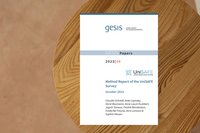gesis report 10/23
Liebe Leser*innen, der Herbst bringt traditionell auch stets die eine oder andere Krankheitswelle mit sich. Auch die Redaktion blieb nicht verschont, daher muss die Oktober-Ausgabe des gesis reports mit ein paar Tagen Verspätung erscheinen. Wir bitten dies zu entschuldigen und wünschen Ihnen viel Freude bei der Lektüre! Ihre Redaktion | Dear readers, autumn traditionally also brings one or the other wave of illnesses. The editorial team was not spared either, so the October issue of gesis report has to be published a few days late. We apologize for this and hope you enjoy reading it! Your editorial team |
Meet the Experts – New talks on "Data Services, Data Archiving, and Research Data Management"
After a presentation, our experts will be available for further discussion and to answer questions. Further information & registration
| GESIS Training Workshops in January 202416/01-18/01 18/01-19/01 29/01-01/02 Check out our other workshops! |
GESIS Workshops 2024 – Tailored to Your Needs
Ready to take your expertise to the next level in 2024? 🚀 We are introducing our latest lineup of workshops in data analysis and more:
- Applied Machine Learning with R
- Introduction to Computational Text Analysis with R
- Using Smartphone Sensors, Apps, and Wearables
- Introduction to Quantile Regression
- Intro to Geospatial Techniques for Social Scientists in R
- Introduction to Deep Learning in R
- Advanced Bayesian Statistical Modeling in R and Stan
- Applied Data Visualization with R
- Geodata and Spatial Regression Analysis
- Qualitative Netzwerkanalyse
For further information and registration, please visit the workshop website.
 | Methodenbericht und weitere Materialien im UniSAFE-Projekt veröffentlichtDas EU-Projekt UniSAFE hat wichtige Materialien und ausführliche Methodenbeschreibungen für die Nachnutzung des bald verfügbaren Datensatzes der UniSAFE-Umfrage veröffentlicht. Dies umfasst einen Methodenbericht, das Codebuch sowie 13 Sprachversionen des Originalfragebogens. Der UniSAFE-Datensatz für die sekundäre Nutzung wird nach dem 29. Februar 2024 aufgrund eines Embargos verfügbar sein. Ziel der UniSAFE-Umfrage war es, Erkenntnisse über die Prävalenz von geschlechtsbezogener Gewalt, einschließlich sexueller Belästigung, in Universitäten und Forschungsorganisationen zu gewinnen. In der Umfrage wurden auch Kontextfaktoren, Determinanten und Folgen von geschlechtsbezogener Gewalt untersucht. Mit über 45.000 Befragten ist sie die größte kulturübergreifende Erhebung über geschlechtsbezogene Gewalt in der Wissenschaft. Alle Materialien finden sich auf dem Web-Profil des Datensatzes: Method report and further materials published in UniSAFE projectThe EU project UniSAFE has published materials and methodology descriptions of the soon-to-be-available dataset of the UniSAFE survey to support secondary use of the dataset, including the method report, codebook, and 13 language versions of the questionnaire. The UniSAFE dataset for secondary use will be available after 29 February 2024 due to embargo. The aim of the UniSAFE survey was to deliver evidence on the prevalence of gender-based violence, including sexual harassment, in research performing organizations. The survey also enquires into contextual factors, determinants, and consequences of gender-based violence. With over 45,000 respondents, it is the largest cross-cultural survey on gender-based violence in the research sector. Materials can all be found here: |
 | Stellungnahme der Allianz der Wissenschaftsorganisationen zur aktuellen Situation in IsraelDie Allianz der Wissenschaftsorganisationen spricht allen Opfern der terroristischen Angriffe auf Israel ihre aufrichtige Anteilnahme aus. Unser Mitgefühl gilt insbesondere unseren Freund*innen und Kolleg*innen in der israelischen Wissenschaftsgemeinschaft. Israel ist immer ein zentraler Partner der deutschen Forschungs- und Innovationsgemeinschaft gewesen und wird dies auch immer sein. Unsere Gedanken sind bei den Opfern und Geiseln aus Israel und aller Welt sowie ihren Familien und Freunden. Wir sind schockiert und entsetzt über die furchtbare Gewalt der Terroristen und verurteilen diese barbarischen Taten aufs Schärfste. Sie führen zu unsäglichem Leid unter der gesamten Zivilbevölkerung. Wir stehen fest in Solidarität mit Israel. http://www.allianz-der-wissenschaftsorganisationen.de/ Statement of the Alliance of Science Organisations in Germany regarding the current situation in IsraelThe Alliance of Science Organisations in Germany expresses its deepest condolences for the victims of the terrorist attacks on Israel. In particular, our sympathy is with our friends and colleagues in the Israeli scientific community. Israel has been and will always be a prime partner for the German research and innovation community. Our thoughts are with all victims and all those taken hostage, and their families and friends. We are shocked and appalled by the atrocious violence that has been perpetrated by the terrorists and strongly condemn these barbaric acts. They cause unspeakable suffering for all civilians. We stand in solidarity with Israel. |
 | Christliche und nicht-religiöse Personen nutzen Online-Pornografie gleich häufigDie Verwendung von Web-Tracking-Panel-Daten liefert neue Erkenntnisse über die Online-Pornografie-Nutzung der Deutschen. Laut einer neuen Studie, die in Archives of Sexual Behavior veröffentlicht wurde, nutzen deutsche Angehörige des Katholizismus, des Protestantismus sowie religiös Ungebundene mit gleicher Wahrscheinlichkeit Online-Pornografie. Mainstream Christians and Non-Religious Equally Likely to Use Online PornographyThe use of web tracking panel data provides new insights into Germans’ online pornography use. According to new research published in Archives of Sexual Behavior, German Catholics, Protestants, and the religiously unaffiliated are as likely to use online pornography as each other. |
 | Neu: Momeni, Mayr, Dietze: Investigating the contribution of author- and publication-specific features to scholars’ h-index predictionDie Bewertung des Outputs einzelnere Forschender ist als Kriterium für Einstellungen und die Karriere von entscheidender Bedeutung und wird in der Regel anhand der wissenschaftlichen Produktivität, der Zitationen oder einer kombinierten Kennzahl wie dem h-Index gemessen. Die Bewertung junger Forschender ist besonders kritisch, da es eine Weile dauert, bis sie Zitate und einen höheren h-Index erreichen. Daher kann die Vorhersage des h-Index helfen, den wissenschaftlichen Einfluss der Forschenden zu ermitteln. Out now: Momeni, Mayr, Dietze: Investigating the contribution of author- and publication-specific features to scholars’ h-index predictionEvaluation of researchers’ output is vital for hiring committees and funding bodies, and it is usually measured via their scientific productivity, citations, or a combined metric such as the h-index. Assessing young researchers is more critical because it takes a while to get citations and increment of h-index. Hence, predicting the h-index can help to discover the researchers’ scientific impact. |
 | Neuer Blog-Beitrag: Dr. Kristi Winters schreibt über die Verwendung von Web-Tracking-Panel-Daten in einer Studie zu Online-Pornografie-NutzungDie Verwendung von Web-Tracking-Panel-Daten liefert neue Erkenntnisse über die Online-Pornografie-Nutzung der Deutschen. Laut einer neuen Studie, die in Archives of Sexual Behavior veröffentlicht wurde, nutzen deutsche Angehörige des Katholizismus, des Protestantismus sowie religiös Ungebundene mit gleicher Wahrscheinlichkeit Online-Pornografie. Im Vergleich dazu nutzen Angehörige von Minderheitsreligionen wie dem Islam oder dem orthodoxen Christentum in Deutschland Online-Pornografie seltener. DOI: 10.34879/gesisblog.2023.71 Zum vollständigen Artikel in Archives of Sexual Behavior: von Andrian-Werburg, M.T.P., Siegers, P. & Breuer, J. A. Re-evaluation of Online Pornography Use in Germany: A Combination of Web Tracking and Survey Data Analysis. Arch Sex Behav (2023). https://doi.org/10.1007/s10508-023-02666-8 New blog post: Dr. Kristi Winters writes about the use of web tracking panel data in a study about online pornography useThe use of web tracking panel data provides new insights into Germans’ online pornography use. According to new research published in Archives of Sexual Behavior, German Catholics, Protestants, and the religiously unaffiliated are as likely to use online pornography as each other. By comparison, members of minority religions in Germany, such as Muslims or Orthodox Christians, are less likely to use online pornography. DOI: 10.34879/gesisblog.2023.71 The full article is available free of charge from Archives of Sexual Behavior: von Andrian-Werburg, M.T.P., Siegers, P. & Breuer, J. A. Re-evaluation of Online Pornography Use in Germany: A Combination of Web Tracking and Survey Data Analysis. Arch Sex Behav (2023). https://doi.org/10.1007/s10508-023-02666-8
|
 | E-Mail wird nicht richtig dargestellt? Jetzt im Browser anschauen! Eine Abbestellung des Newsletters "gesis report" ist jederzeit über diesen Link möglich: https://lists.gesis.org/mailman/listinfo/gesis-newsletter Sie können uns auch gerne eine E-Mail senden: gesisreport@gesis.orgDie Datenschutzhinweise von GESIS können Sie über folgenden Link einsehen: https://www.gesis.org/institut/datenschutz/ Display problems? No images? Open the newsletter in your browser! You can unsubscribe from the newsletter "gesis report" at any time via this link: https://lists.gesis.org/mailman/listinfo/gesis-newsletter You can also send us an e-mail: gesisreport@gesis.org The GESIS data protection information can be viewed via the following link: https://www.gesis.org/institut/datenschutz/ |

